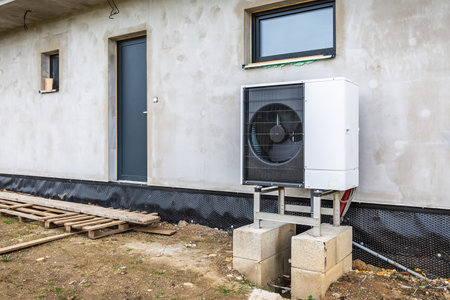Introduction to Hybrid Heating Systems
Hybrid heating systems are rapidly emerging as a preferred solution for property owners and tenants across the UK. As the drive towards energy efficiency intensifies and government policies increasingly focus on reducing carbon emissions, integrating heat pumps with traditional heating methods offers an innovative approach that meets both regulatory requirements and modern tenant expectations. In essence, a hybrid heating system combines two or more types of heating technologies—most commonly a heat pump paired with a conventional gas or oil boiler—to deliver optimal comfort while maximising energy savings. This dual approach enables properties to automatically switch between energy sources depending on factors such as outdoor temperature, energy tariffs, and overall demand, resulting in enhanced operational efficiency and reduced utility bills. With tenants becoming more environmentally conscious and landlords facing stricter legal obligations concerning Energy Performance Certificates (EPCs), hybrid systems present a pragmatic response that balances sustainability with reliable indoor warmth. In this article, we will explore why hybrid heating systems are becoming increasingly popular in the UK’s rental market and how they help address evolving standards in both performance and occupant satisfaction.
2. How Heat Pumps Work
Heat pumps are at the core of modern hybrid heating systems, offering an energy-efficient alternative to conventional boilers. Fundamentally, a heat pump operates by transferring thermal energy from one place to another—typically extracting heat from the outside air or ground and moving it indoors. This is achieved through a refrigeration cycle, which involves evaporation and condensation within a closed loop system. Unlike traditional gas or oil boilers that generate heat by burning fuel, heat pumps simply move existing heat, making them remarkably efficient.
Environmental Benefits of Heat Pumps
One of the primary advantages of heat pumps is their environmental impact. Since they use electricity to transfer rather than generate heat, they emit significantly less carbon compared to fossil fuel-based systems. For British households aiming to reduce their carbon footprint in line with government targets for net zero emissions, installing a heat pump can be a decisive step. Moreover, when paired with renewable electricity tariffs or solar panels, the environmental benefits are further amplified.
Integration into British Homes
Heat pumps can be integrated seamlessly into both new-builds and existing properties across the UK. They are particularly well-suited to the British climate because they can extract heat even in relatively low outdoor temperatures. When incorporated as part of a hybrid system, they operate alongside traditional boilers or radiators, switching between sources depending on efficiency, demand, and external conditions.
Comparison: Heat Pumps vs Traditional Heating Methods
| Feature | Heat Pump | Traditional Boiler |
|---|---|---|
| Fuel Type | Electricity (and ambient air/ground) | Gas/Oil |
| Carbon Emissions | Low (especially with renewable electricity) | High |
| Efficiency (COP*) | Up to 400% | 80-90% |
| Suits British Climate? | Yes | Yes |
*COP: Coefficient of Performance – ratio of energy output to input.
The versatility and efficiency of heat pumps make them an increasingly attractive option for homeowners looking to modernise their heating while adhering to UK sustainability standards.
![]()
3. Integrating Heat Pumps with Traditional Heating Methods
Integrating heat pumps with conventional heating systems, such as gas boilers or radiators, is a strategic approach to achieving both efficiency and reliability in British homes. This hybrid configuration allows homeowners to benefit from the renewable energy efficiency of heat pumps whilst retaining the familiarity and high-output capabilities of traditional systems during periods of increased demand or particularly cold weather. The process typically involves connecting a heat pump to the existing central heating infrastructure, so that the heat pump becomes the primary source for day-to-day heating needs. When temperatures drop significantly, the system automatically switches to or supplements with the gas boiler or another conventional source, ensuring comfort levels are consistently maintained.
Advantages of Hybrid Integration
The chief advantage lies in flexibility. A hybrid heating system intelligently selects the most efficient energy source at any given time, often controlled by smart thermostats or integrated management systems. This results in lower running costs and reduced carbon emissions compared to relying solely on fossil fuels. Another key benefit is enhanced reliability; if one system requires maintenance or fails, the other can temporarily take over, minimising disruption. Furthermore, this integration supports future-proofing properties against evolving UK energy regulations and rising fuel prices.
Compatibility Considerations
Before integrating a heat pump with an existing heating system, it’s important to assess compatibility, particularly regarding radiator size and pipework condition. Many older British homes may require some upgrades to maximise the efficiency of the combined system.
Summary
By combining heat pumps with traditional heating methods, homeowners can optimise comfort, increase energy savings, and ensure their heating solution remains robust throughout the unpredictable British climate.
4. Legal, Regulatory, and Tenancy Considerations
The integration of hybrid heating systems—combining heat pumps with conventional boilers—into UK properties brings a unique set of legal and regulatory considerations, particularly when these installations take place in the private rented sector. Both landlords and tenants must be aware of how these changes affect their rights, obligations, and compliance with current legislation.
UK Regulations Governing Hybrid Heating Systems
The installation and operation of hybrid heating systems are governed by a number of statutory instruments and industry standards. Key regulations include:
| Regulation/Standard | Relevance to Hybrid Heating Systems |
|---|---|
| Building Regulations (Part L) | Specifies minimum energy efficiency standards for new heating systems, including requirements for low-carbon technologies like heat pumps. |
| Minimum Energy Efficiency Standards (MEES) | Requires privately rented properties in England and Wales to meet at least EPC rating E; hybrid systems may improve ratings and facilitate compliance. |
| Gas Safety (Installation and Use) Regulations 1998 | Continued relevance where boilers are part of the hybrid system; annual gas safety checks remain mandatory. |
| Electrical Safety Standards in the Private Rented Sector (England) Regulations 2020 | Applies to electrical components of heat pumps within hybrid systems; periodic inspection and testing required. |
Compliance Requirements for Landlords
Landlords must ensure any installation or upgrade involving hybrid heating is carried out by qualified professionals holding relevant certifications such as Gas Safe Register (for gas boilers) or MCS certification (for heat pumps). Additionally, all documentation regarding installation, servicing, and compliance certificates should be retained and made available to tenants upon request.
Impact on Tenancy Agreements
The addition of a hybrid heating system can necessitate amendments to existing tenancy agreements, particularly concerning:
- Maintenance Responsibilities: Clearly outlining whether routine maintenance is the landlord’s or tenant’s responsibility, especially as hybrid systems may require specialist servicing.
- Access Arrangements: Ensuring clauses permit landlord access for regular servicing or emergency repairs to both the boiler and heat pump components.
- Energy Performance: Updating the EPC to reflect improvements may be necessary, which could positively impact marketability and rent levels.
Landlord Obligations at a Glance
| Obligation | Description | Hybrid System Impact |
|---|---|---|
| Provide Safe Heating Systems | All installed equipment must be safe and compliant with UK law. | Adds complexity due to dual technologies; requires ongoing vigilance. |
| EPC Compliance | Property must meet MEES requirements before new tenancies commence. | Hybrid systems may enhance EPC rating but documentation is crucial. |
| Regular Servicing & Maintenance | Boilers require annual service; heat pumps per manufacturer guidance. | Differing schedules increase administrative burden for landlords. |
| Documentation & Information Sharing | Provision of operating manuals, safety certificates, and energy information to tenants. | Comprehensive records are essential for both systems. |
In summary, while hybrid heating systems offer significant efficiency benefits, they also introduce additional legal responsibilities for landlords. Ensuring compliance with UK regulations—and reflecting changes clearly in tenancy agreements—is vital to avoid disputes and penalties. Both parties should seek professional advice when negotiating terms related to advanced heating technology in rental properties.
5. Practical Considerations for Landlords and Tenants
Installation: Navigating the Process
For landlords considering a hybrid heating system—combining heat pumps with traditional boilers—the installation process requires careful planning. Its essential to engage accredited engineers familiar with both modern and legacy systems, ensuring compliance with UK regulations such as the Building Regulations Part L. Pre-installation surveys are advisable to assess property suitability, especially in older homes common across the UK, where insulation upgrades might be needed for optimal performance.
Maintenance Responsibilities and Agreements
Ongoing maintenance is key to keeping hybrid systems efficient and compliant with safety standards. Landlords must clarify responsibilities for servicing both the heat pump and existing boiler within the tenancy agreement. Annual checks are often a requirement, and it’s wise to document these obligations explicitly, referencing relevant sections of the Landlord and Tenant Act 1985 to avoid ambiguity.
Cost Implications: Upfront and Ongoing
The initial investment for hybrid heating can be higher than single-system alternatives, but landlords may benefit from grants or incentives under schemes like the Boiler Upgrade Scheme (BUS) in England and Wales. Ongoing running costs may decrease due to improved efficiency, but tenants should be made aware of potential fluctuations in energy bills. Transparency over cost-saving projections helps foster trust and reduces disputes over utility charges.
Communication and Consent
Clear communication is vital when introducing significant upgrades to a rental property. Landlords should provide written notice ahead of any works, respecting tenants’ right to quiet enjoyment under the Housing Act 1988. Consultation meetings can help address tenant queries about operational changes and reassure them regarding disruption or access during installation and maintenance periods.
Best Practice: Documenting Upgrades
It is prudent for landlords to keep comprehensive records of installations, warranties, maintenance schedules, and all communications relating to the upgrade. This documentation not only protects against future disputes but also supports compliance with deposit protection schemes if deductions are ever necessary for system misuse or damage.
Summary for Stakeholders
Ultimately, integrating a hybrid heating system represents a significant property improvement that benefits both landlord and tenant—provided practical steps regarding installation, cost-sharing, maintenance obligations, and clear communication are embedded in the tenancy relationship from the outset.
6. Case Studies and Real-Life Examples
Hybrid heating systems are gaining traction across the UK, particularly in the rental sector where landlords seek both energy efficiency and compliance with evolving regulations. Here are several case studies and real-life examples from different regions, demonstrating successful hybrid heating system integrations in rental properties.
London: Victorian Terrace Retrofit
A landlord in North London retrofitted a Victorian terraced house with a hybrid system combining an air source heat pump and a modern gas boiler. This integration allowed tenants to benefit from reduced energy bills and consistent warmth during colder months. The property’s EPC rating improved from D to B, making it more attractive to environmentally conscious renters while ensuring compliance with MEES (Minimum Energy Efficiency Standards).
Manchester: Student Accommodation Upgrade
In Manchester, a student accommodation provider upgraded several units by integrating heat pumps with existing radiators powered by a gas boiler. The hybrid approach enabled effective zoning of heating and maximised off-peak electricity tariffs. Tenants reported greater comfort levels, and the landlord benefitted from reduced maintenance costs and eligibility for local council grants supporting green initiatives.
Edinburgh: Listed Building Adaptation
An Edinburgh-based letting agent managed the installation of a hybrid heating system in a listed Georgian flat, overcoming challenges posed by planning restrictions. By pairing a compact heat pump with the original central heating system, the property maintained its historic character while meeting higher energy efficiency standards. This upgrade helped secure long-term tenants seeking sustainable living options in heritage homes.
Bristol: Family Home Transformation
A Bristol landlord converted a semi-detached family home’s outdated oil boiler system to a hybrid setup featuring a ground source heat pump and high-efficiency boiler. The transition resulted in substantial carbon savings and qualified the property for government incentives under the Boiler Upgrade Scheme, offsetting installation costs while appealing to eco-conscious families.
Summary of Success Factors
These examples illustrate that hybrid heating systems can be tailored to diverse property types across the UK rental market. Key factors contributing to successful integrations include careful assessment of building fabric, leveraging available grants or incentives, and clear communication between landlords, tenants, and installers. Such case studies underscore the practical viability of hybrid systems as part of the UK’s transition toward low-carbon housing stock.
7. Summary and Key Takeaways
In conclusion, hybrid heating systems—combining the efficiency of heat pumps with the reliability of traditional gas or oil boilers—offer a balanced solution to the demands of modern property heating in the UK. This integration addresses both environmental concerns and practical heating requirements, particularly relevant given the country’s variable climate and evolving energy regulations. For landlords, homeowners, and property managers, the primary considerations include initial installation costs, ongoing maintenance obligations, and compliance with government incentives such as the Boiler Upgrade Scheme. When evaluating whether to adopt a hybrid system, stakeholders should conduct a thorough assessment of their propertys current infrastructure, insulation levels, and energy consumption patterns. Engaging qualified installers and ensuring all contractual terms for installation and servicing are clear will help mitigate risks associated with warranties or performance guarantees. Ultimately, while upfront investment may be higher compared to conventional systems, the long-term benefits—reduced carbon footprint, improved EPC ratings, potential fuel savings, and future-proofing against regulatory changes—make hybrid heating an attractive proposition for those seeking both sustainability and operational flexibility within their property portfolio.


